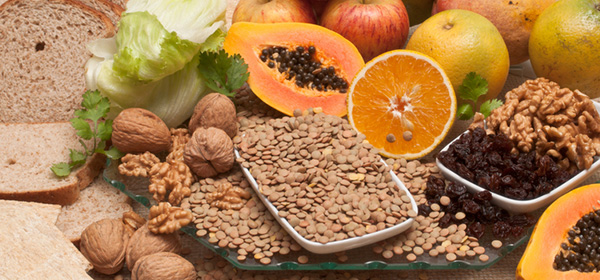There are two types of dietary fibre – soluble and insoluble.
- Soluble fibre absorbs water and becomes a thick substance that slows down digestion. It keeps you feeling full for longer, helping to prevent weight gain.
- Insoluble fibre has the opposite effect, speeding up the passage of food through the digestive tract, and giving your stool bulk. It’s great for colon health.
How fibre benefits you:
- helps boost your energy levels
- provides fuel for the good bacteria (probiotics) in your gut
- prevents constipation and diarrhoea
- controls blood sugar levels
- protects against diseases such as bowel cancer, heart disease and diabetes
- aids weight loss by keeping you feeling sated
- helps flush toxins from the body.
Five ways to get enough fibre every day:
Add fibre-rich vegetablesto your salad
Salad leaves such as rocket and lettuce contain iron, vitamins K and C, and beta-carotene, but not much in the way of insoluble fibre. It’s important to add fibre-rich vegies such as cabbage, Brussels sprouts, carrots, artichokes and broccoli into your salad mix.
Replace juices with raw fruit and vegetables
Fruit and vegetable juices taste delicious but the sugar content is high and the nutritional benefits are low. If you’ve ever made your own juices, you’ll know how much pulp goes to waste. This pulp contains natural fibre. Additionally, avoid peeling your apples, pears, grapes, carrots, potatoes and even pumpkin, as these skins are also rich in fibre.
Aim to eat at least five servings of vegetables and two serves of raw fruit each day.
Eat wholefoods
Wholegrains contain twice the amount of insoluble fibre of refined grains. Where possible, choose 100 per cent wholemeal bread over white and multigrain. The same rule applies for pasta and rice. When it comes to breakfast cereals, oats are great soluble fibre option.
Boost your beans
Adding beans, peas, lentils and chickpeas will not only increase your solublefibre intake, but also your protein and iron. However, they don’t come without their windy downside.To reduce flatulence, soak dried legumes in cold water for around 18 hours. This will remove most of the oligosaccharides, a type of carbohydrate that tends to ferment in the colon and lead to gas.
Choose high-fibre snacks
Great snacks that are high in fibre (and nutrient-dense) include nuts, popcorn, fruit and wholegrain crackers. Nuts and seeds may be high in fat, but just a handful contains enough unsaturated fats to help lower cholesterol levels and your risk of heart disease.
Read more about fibre at bodyandsoul.com.au

